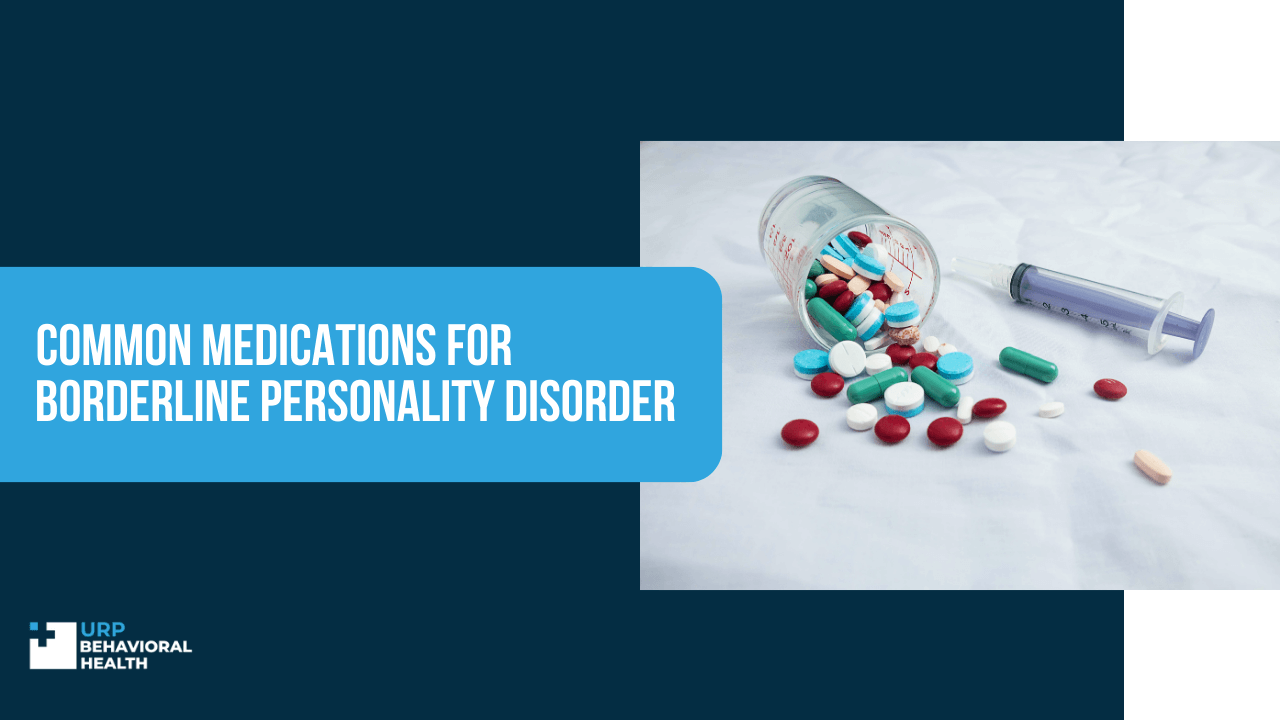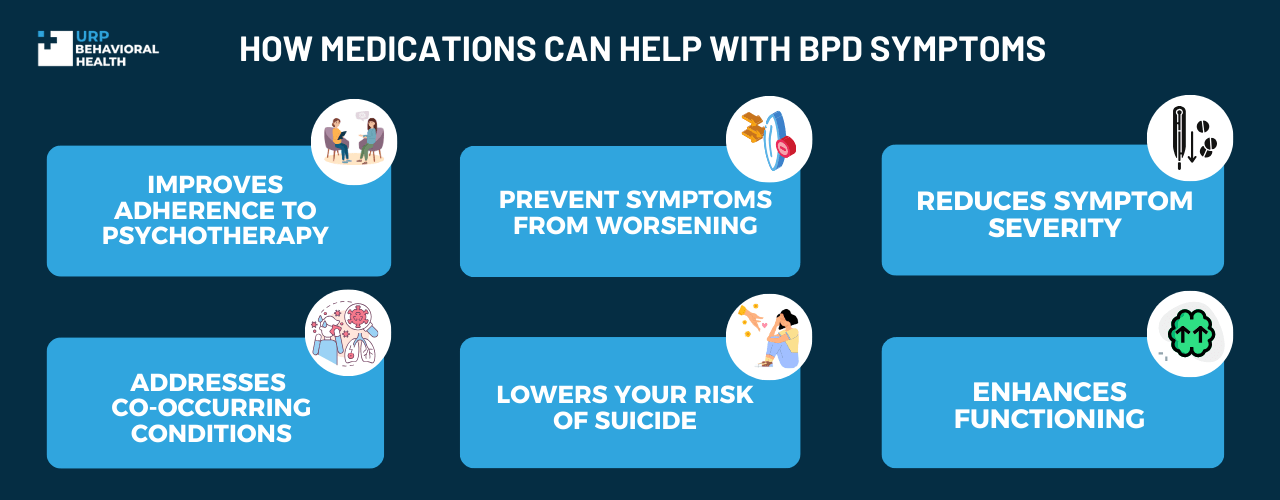Common Medications For Borderline Personality Disorder

Borderline personality disorder is marked by an unstable self-image, relationships, and mood. It affects about 1.6 percent of the general population and falls under the Cluster B category of personality disorders, typically characterized by erratic and dramatic emotional reactivity. Having BPD makes it difficult to regulate your emotions, so you become upset easily and have a hard time calming down. And poor emotional regulation is what fuels impulsive and potentially self-destructive behavior.
Fortunately, therapeutic interventions have proven to be highly effective in improving symptoms and helping people recover from symptoms. Currently, there is no medication that’s FDA-approved for the treatment of BPD. Although the most effective evidence-based approach involves the use of psychotherapy, mental health practitioners have found some drugs to be useful in addressing symptoms. Let’s look at the types of medications used during the BPD treatment process.


Types of Medications Used in BPD Treatment
Antidepressants
Venlafaxine, fluoxetine, and bupropion are a few examples of antidepressants that are prescribed to people with BPD. Typically, antidepressants were developed to treat the symptoms of major depression, specifically low mood. However, doctors and mental health practitioners have started prescribing them for people with other disorders, including BPD.
Researchers have looked into the use of various types of antidepressants for the treatment of BPD, including selective serotonin reuptake inhibitors, tetracyclic and tricyclic antidepressants, and monoamine oxidase inhibitors. If you’re experiencing emotional reactivity, anxiety, or persistent sadness, you may get a prescription for antidepressants. However, they don’t have a strong effect on symptoms like impulsivity and anger.
Mood Stabilizers
Mood stabilizers like carbamazepine and valproate, as well as anti-seizure medication, are used to treat symptoms of emotional reactivity and impulsivity in people with BPD. Current research indicates that people with BPD are often prescribed mood stabilizers and that they have proven to be effective.
Antipsychotics
Aripiprazole, risperidone, and olanzapine are some of the antipsychotics that, if needed, are typically prescribed to people with a BPD diagnosis. The term ‘borderline’ is used to name the condition because medical practitioners previously considered the disorder to be on the border between neurosis and psychosis. Because of this theory, antipsychotics were among the first types of medications to be used in the treatment of BPD.
Even though psychotic symptoms don’t accompany BPD, antipsychotic drugs can have a positive effect on different disorders. Studies have found that they can alleviate symptoms like impulsivity, hostility, and paranoid thinking in people with a diagnosis of BPD. And if you’re aware of the symptoms, you’ll know that one of them includes paranoid ideation, which makes antipsychotics a suitable recommendation.
Anxiolytics
Lorazepam, buspirone, and alprazolam are a few of the anxiolytics that may be prescribed to address anxiety symptoms in people with BPD. Typically, it’s possible to reduce anxiety using antidepressant medication, but when you experience intense anxiety, you may need anxiolytics. Unlike antidepressants, which regulate levels of neurotransmitters in your nervous system, anti-anxiety drugs work by slowing down brain activity.
Currently, there’s little research to prove the effectiveness of anti-anxiety medication for the treatment of BPD. More importantly, some medications, such as benzodiazepines, can be habit-forming, indicating a risk for physical and psychological dependence. Therefore, prescribing them can be dangerous, especially for people with a co-occurring substance use disorder.

How Medications Can Help With BPD Symptoms
Improves Adherence To Psychotherapy
When you’re struggling with symptoms like low mood and anxiety in addition to BPD symptoms, it becomes much harder to focus on therapy. In this case, your practitioner can prescribe medications that ease your symptoms and make it easier to engage in therapy.
Prevent Symptoms From Worsening
Although psychotherapy is highly effective in addressing BPD symptoms, it takes some time to show results. Moreover, some symptoms can get worse over time, so prescribing medication can prevent this from happening while you’re seeking therapy.
Reduces Symptom Severity
While medications may not eliminate BPD symptoms entirely, they can make them more manageable. This is especially true in the case of symptoms like anxiety, depression, irritability, and dissociation.
Addresses Co-Occurring Conditions
One of the major reasons BPD is misdiagnosed is because it co-occurs with other disorders, the symptoms of which can interact and overlap. This makes it much harder to diagnose BPD. Common disorders that co-occur with BPD include depression, substance abuse, bipolar disorder, and anxiety disorders.
If you’re diagnosed with any of these disorders in addition to BPD, they can get in the way of the treatment process. Therefore, your practitioner may prescribe medications to treat co-occurring conditions.
Lowers Your Risk of Suicide
Self-harming and suicidal behavior are common features of BPD. If you present with severe symptoms, your practitioner may prescribe medication to alleviate symptoms to reduce the risk of self-harming behavior.
Enhances Functioning
Since BPD medication reduces symptom intensity and frequency, it improves functioning in areas such as daily living and relationships.
Monitoring and Adjusting Medication
As mentioned before, practitioners only consider prescribing medications as an adjunct to psychotherapy. Even then, it’s important to monitor the effects of your medication and adjust it if needed. Medications like antidepressants can take some time before you feel any difference. Therefore, it’s important to take them consistently to monitor their effects. The best way to do so is to write down a medication schedule and track changes in your dosage.
Moreover, it’s best to speak with your doctor before starting any medication for BPD. They’ll be able to inform you about any side effects that you should look for. This can include minor side effects that lessen with time or more severe ones, like seizures. If your side effects persist despite consistent use, let your practitioner know so they can adjust your dosage or switch to another medication.
Let Us Guide you Towards Healing
We know that seeking treatment can be overwhelming, but our staff is here to make the process as smooth as possible. We’re available 24/7 to address any questions or concerns you may have.

